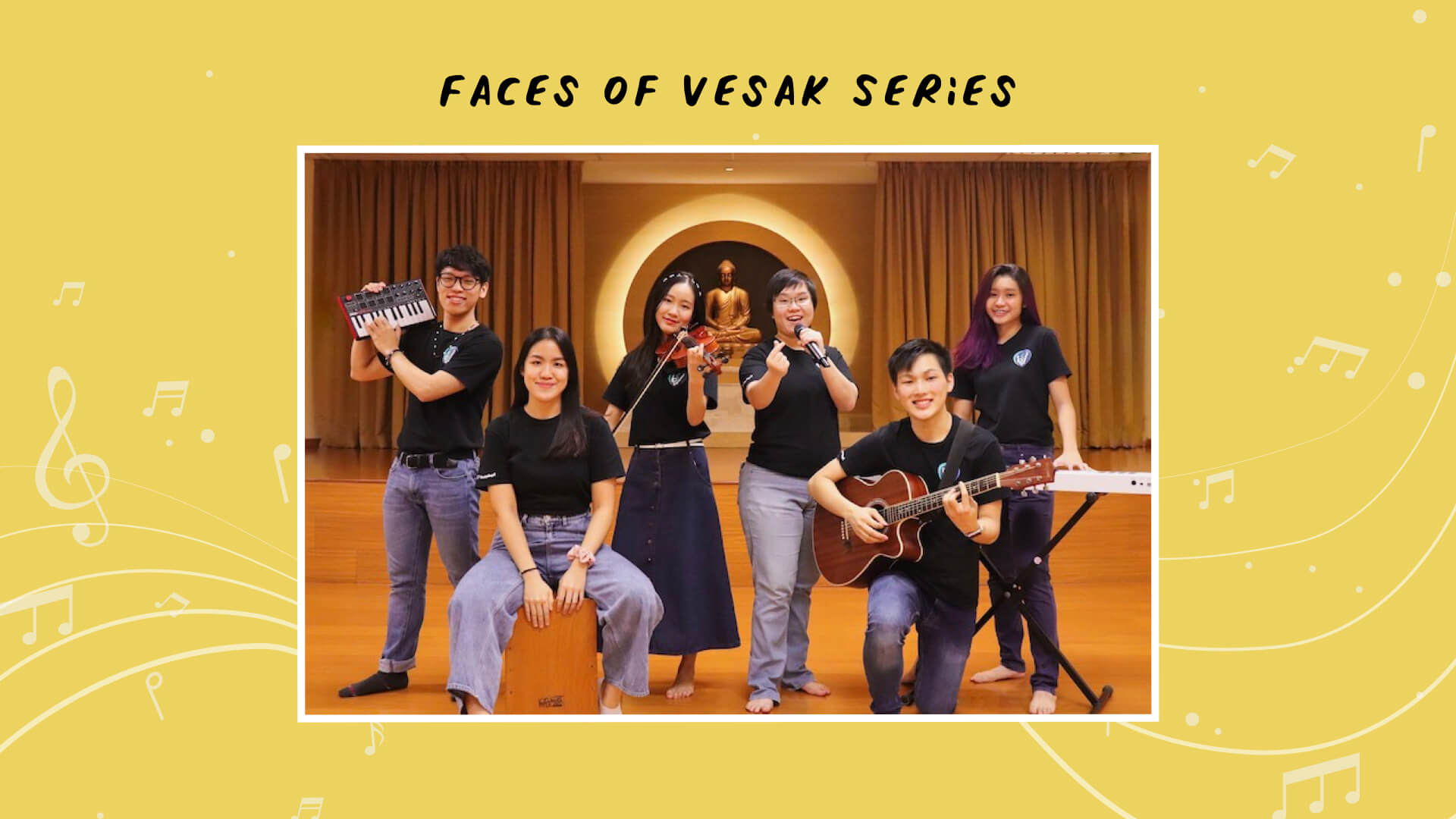As part of the Faces Of Vesak series, our podcast host spoke with the lead singer Pauline and the guitarist Kelvin from BuddySings!, a youth band that sprouted from Bandar Utama Buddhist Society (BUBS) in Malaysia.
The contents of this article are extracted from a podcast interview with them. Listen to the full episode here:
Cheryl: Tell us more about yourself and BuddySings!
Pauline: I’m one of the co-founders of BuddySings! and am currently the leader of the team.
Kelvin: I do most of the music production and arrangement in Buddysings!
Buddysings! is an outlet for us to share the joy and the values of Dharma through music. Music acts as a stepping stone for people to learn the Dharma.
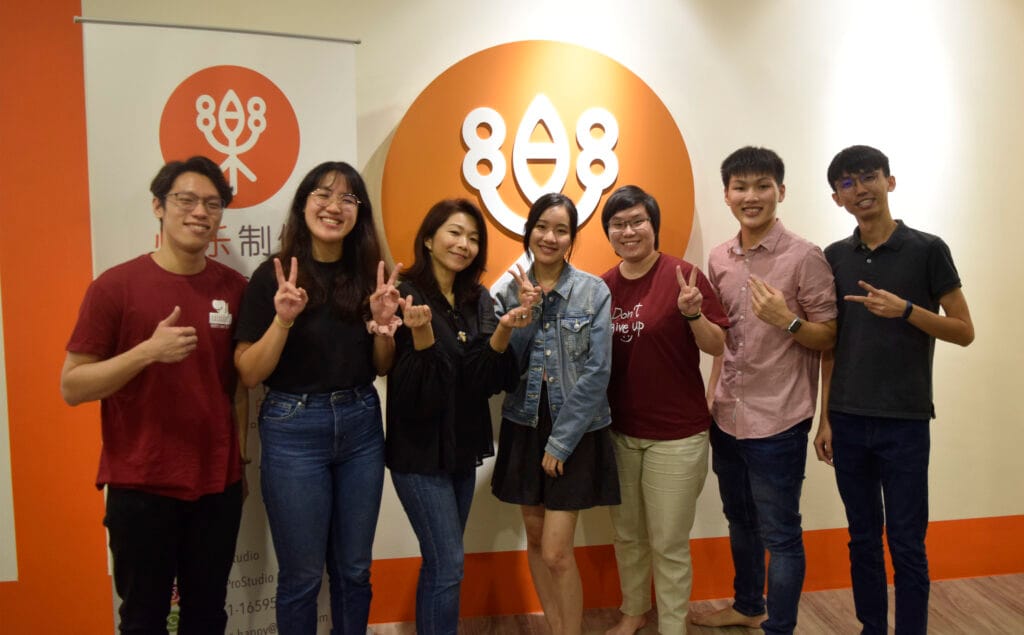
Cheryl: How would you describe BuddySings! in three words?
Kelvin:
I’ll be more mainstream and say, music, fellowship, as well as learning.
Our events and programmes are all focused around music. Hence, music.
Fellowship because a lot of what we do is really centred around doing things together. As human beings, it’s very difficult for us to do things on our own. We always need to learn from each other and to actually do things together to split the workload. There’s a lot of fellowship involved in that and learning how to work with people learning how to enjoy accomplishments together.
Lastly, learning because there’s much more to running these things or any content creation platform than what meets the eye. You know, all the ins and outs, the tiny little things that the audience does not see. So there’s a lot of learnings in that area.
Pauline:
Wow. Great answer. Those three words just covered everything.
For me, I would say the first thing that popped up in my mind was roller coaster because we face a lot of ups and downs. This is especially so during the pandemic. It affected us a lot. But we also have the good times.
The second word, I would use to describe BuddySings! is experience. Similar to what Kelvin said, I really learnt a lot, especially from Kelvin, about audio production. I didn’t know so much technicalities go behind recording.
The third word is family. This is because through working together, I really got to know the teammates. And I enjoy the time that we spend after practice. We would go to McDonald’s to hang out and chit chat. I would say that it’s a time well spent that for me.
Cheryl: I really love the three words that both of you have shared with me. BuddySings! is beyond the end product, it is about the journey, the fellowship, and creating music that inspires people.
For me, from an audience point of view, the three words that came to mind was really fun, energetic and fresh. I watched your life mini concert, and was listening to the song Kattanuta, I felt it’s very new. Because we grew up in the era of Igemz, with the ‘old songs’, it has been a long time since we’ve seen such fresh music. Just seeing all of you come together and have fun on stage was fresh. So thank you for the music that you bring. I could really see that that strong bond that all of you have with each other.
Pauline:
It’s been about 10 years since we have new English (Buddhist) music. So, yes I do feel that ‘fresh’ is a good word to describe what we do. In the beginning, we were a bit worried, because it’s something so new — in terms of the arrangement, and in terms of the technology that we use in audio production.
Because everything was more modernised, we were a little bit worried about how people would perceive this, especially in the Buddhist community. However, we received good feedback and that kept us going.
Kelvin:
Yes. And more importantly, we’re glad that you enjoyed the concert.
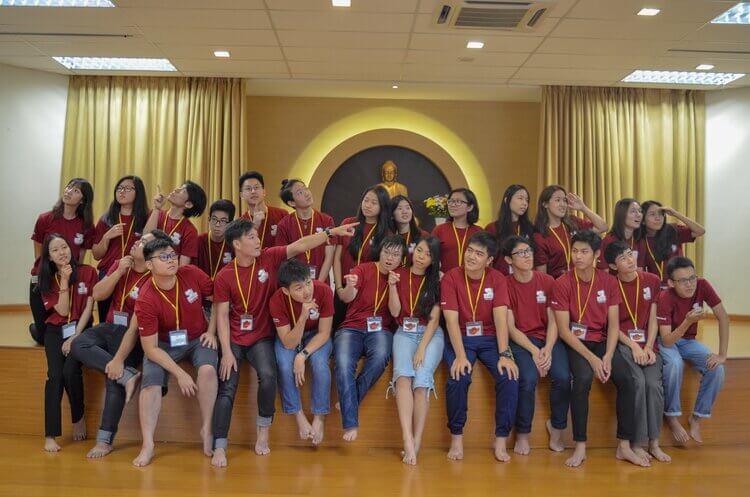
Cheryl: What led to the formation of Buddysings?
BuddySings! was founded by three people. There’s me, Kelvin and Robin. The three of us were involved in the youth group of Bandar Utama Buddhist Society. Every year, we would organise a Buddhist camp for teens between the age of 13 and 17 years old, which are secondary school students.
One time, we were organising a camp called kataññutā. Someone just made a casual remark about having a camp song because we never had that before. No one took it seriously, except for Robin. He started to pen down some lyrics, and get some lines of inspiration. He started to write the chorus and created some melody.
At that time, it was 2018 and I was the one leading the camp committee. So, Robin approached me first and said, “Hey, I have an idea about a camp song, and maybe you could sing.” At that time, I was exposed to singing in my university and Robin knew about that. After that, we caught up Kelvin, whom we realised is really good in music, and shared the demo.
So, that is how the three of us came together and wrote down a song. In short, Robin started it, I finished the song together with him and we passed it on to Kelvin, and Kelvin made it beautiful. So we had a rough draft that was a home recording and we played it during the camp and a lot of people loved it. That’s when we realised that we got a knack for this and that we should continue.
We got that fire ignited within us and Robin started to write more songs and we all just came together. We got Madeline, which is Robin’s sister, and also Deborah, who plays the violin to join and form Buddysings! and continue to create music. So the five of us are like the original members of the band.
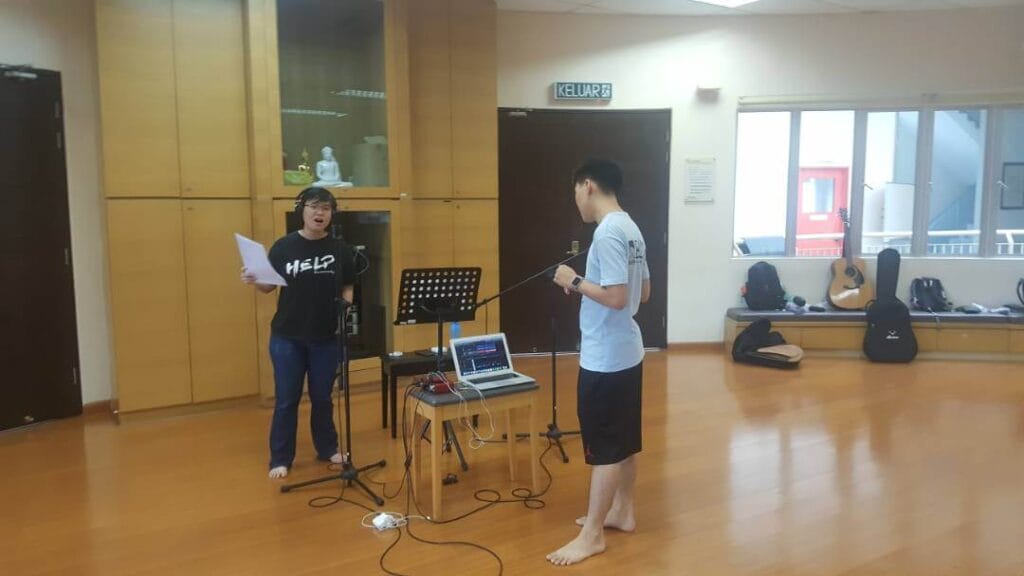
Cheryl: Tell us a little bit more about the obstacles you’ve faced on the creativity side and on the personal side.
Kelvin:
For me, from the music and production perspective, there is a problem that’s not only faced by Buddysings!, but throughout the Buddhist community. That is the lack of resources and manpower.
As you know, most of the times, we are doing this (music) out of our own goodwill and out of our interest. We don’t get paid for it and we do not earn anything from it. All we earn is the fun and the happiness and the joy that it (the process) brings.
Because of this (not being commissioned to perform and produce music), it’s difficult to attract people to join, to put in their time to actually make things work. Editing music, editing videos, creating and arranging, these all take time. As some people would say time is money, the lack of both time and money are obstacles for us.
But we were lucky enough to get a lot of support from the community as well as a lot of support from our parent body, Bandar Utama Buddhist Society (BUBS). We were fortunate for this and we were able to get through that (difficult times).
Pauline:
Yeah, I agree with him. In terms of commitment, because what we’re doing is voluntary, only those who has the interest or the passion will commit their time and effort into this. But because a lot of us are either a student, or a working adult like myself, it is hard to juggle between work, studies and other commitments.
For me personally, this trains me in the aspect of personal development such as managing my time, managing the stress levels, and managing our resources. Every little pockets of time that we have is precious as they can accumulate and contribute to (finishing) end product. On top of that, we work together as a team beyond the music production. We have to manage finances, manage the team, delegate the workload, etc.
For example, planning on who can take up the design, editing and audio, and then we have to find a time for everyone to come together or arrange for members to record individually. During the pandemic recordings had to be done remotely and virtually. Some of the team members do not have the proper equipment at home, then Kelvin, would have to go through a lot to edit our voices.
I believe that there’s always a better way to do things. If we find the right way to do it, and we have the passion and interest, we can definitely pull it off. After which, you will have that happiness and joy, and feel a sense of achievement that you have achieved as a team. This may help you think that the challenges are worthwhile.
Cheryl: What impact do you wish to create in the Buddhist community through ‘Buddysings!’ ?
Kelvin:
I hope, Buddysings! would be a touch point where people get exposed to Buddhism and to have a taste of what Buddhism is like. And for practising Buddhists, we hope that the songs can be a constant reminder of the Buddhist teachings. The songs can be something that you listen on the way to work or on the way to school in order to be reminded of the teachings. This is the best that we can hope for.
Pauline:
Similar to Kelvin, Buddysings! acts as a touch point, and a medium to the Dharma. And I’m saying this from personal experience. Within the band, some of us have been attending Dharma school since primary school or when we were really young. We usually have sing-along sessions before Dharma classes. So that was when we were exposed to all these hymns. It was a whole lot of fun, and it’s very enticing or attractive method. It was a different way for us to learn and experience the Dharma. Music is one of the mediums to reach out to people, especially for the younger generation. With music, we would be able to connect better with the kids, youth, teens, especially with those who are avid music listeners.
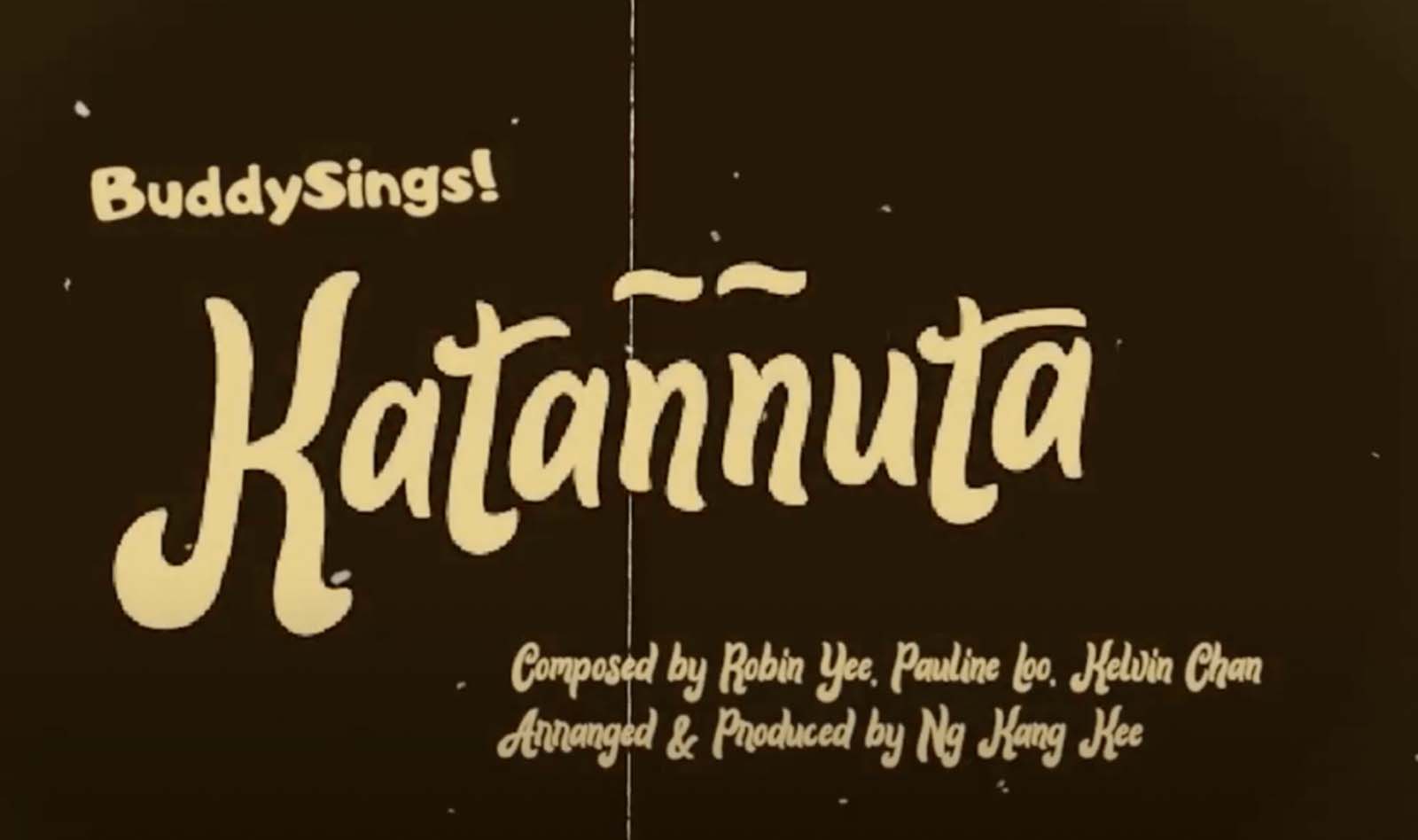
Share with us the meaning behind the song Kataññutā
Kataññutā is a Pali word for gratitude. It means knowing or recognising what has been done for one’s benefit.
Mainly in this whole song, we wish to remind people to count their blessings, to appreciate what they have, instead of focusing on what they don’t have.
“We may be blinded by the wants in our minds, and losing what’s right in front of us.” – this is the bridge of the song.
It is a reminder that the things that we want are endless. We can want a lot of things, but doesn’t mean we can get them. We may feel very unhappy, frustrated, if we constantly focus on the things that we don’t have. There are things that is right in front of us such as family, love, food, shelter, these little simple things in life that we have that we may take for granted. Yeah.
I really like this verse a lot. Because it reminds me to count my blessings and to see things on the bright side on the positive side.
Cheryl: How has Dharma music helped or motivated you in your Buddhist practice?
Personally, Dharma music is a reflection of the Dharma is like and a constant reminder for myself.
We have written a song called “Nothing stays the same forever.” It’s still in the production pipeline, but I think not just with that particular song, but with all the songs that we write, we see how nothing stays the same forever. From the minute someone writes down the lyrics, adds the melody and edits the track, you realise that the song would have changed a lot. For me, I also come to realise that the meaning of the song would also change a lot.
For example, Kataññutā was written for the camp. So the main objective or the main meaning for me was more of a summary of what happened in camp and summary of what we’ve learned in camp. But as we continue to make the song better and do edits, I realised that I started to take the song more literally. The song became a reminder of the things that I’m grateful for around me. And I am grateful for the opportunity to produce the song and being able to share the Dharma through music.
Cheryl: Where can people find you and your work?
Facebook: https://www.facebook.com/buddysingsofficial/live_videos/
Instagram: https://www.instagram.com/buddysingsofficial/
Website: https://www.buddysings.com/
Spotify: https://open.spotify.com/artist/3YEsuPF1LbWUenDl8OTwLh?si=rNiwEZ74QAWOChQ9inHuNA
Check out BuddySings!’s new single: Wheel of Life:

